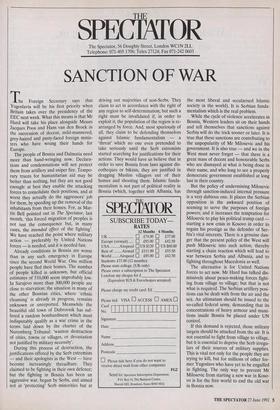SPECT THE AT OR
The Spectator, 56 Doughty Street, London WC1N 2LL Telephone: 071-405 1706; Telex 27124; Fax 071-242 0603
SANCTION OF WAR
The Foreign Secretary says that Yugoslavia will be his first priority when Britain takes over the presidency of the EEC next week. What this means is that Mr Hurd will take his place alongside Messrs Jacques Poos and Hans van den Broek in the succession of decent, mild-mannered, grey-haired and pasty-faced foreign minis- ters who have wrung their hands for Europe. The people of Bosnia and Dalmatia need more than hand-wringing now. Declara- tions and condemnations will not protect them from artillery and sniper fire. Tempo- rary truces for humanitarian aid may be better than nothing, but they are not good enough: at best they enable the attacking forces to consolidate their positions, and at worst they actually do the aggressors' job for them, by speeding up the removal of the inhabitants from their homes. For, as Mar- tin Bell pointed out in The Spectator, last month, 'this forced migration of peoples is not iust the consequence but, in many cases, the intended effect of the fighting'. We have reached the point where military action — preferably by United Nations forces — is needed, and it is needed fast.
Already conditions in Bosnia are worse than in any such emergency in Europe since the second World War. One million people have fled their homes. The number of people killed is unknown, but official estimates of 510,000 seem improbably low. In Sarajevo more than 300,000 people are close to starvation; the situation in many of the other Bosnian cities, where 'ethnic cleansing' is already in progress, remains unknown or unreported. Meanwhile the beautiful old town of Dubrovnik has suf- fered a random bombardment which must indisputably qualify as a war crime in the terms laid down by the charter of the Nuremberg Tribunal: 'wanton destruction of cities, towns or villages, or devastation not justified by military necessity'.
During this process of destruction, the justifications offered by the Serb extremists — and their apologists in the West — have become increasingly threadbare. They claimed to be fighting in their own defence; but the fighting in Bosnia has been an aggressive war, begun by Serbs, and aimed not at 'protecting' Serb minorities but at
driving out majorities of non-Serbs. They claim to act in accordance with the right of any region to self-determination; but such a right must be invalidated if, in order to exploit it, the population of the region is re- arranged by force. And, most spuriously of all, they claim to be defending themselves against Islamic fundamentalism — a `threat' which no one even pretended to take seriously until the Serb extremists started searching for justifications for their actions. They would have us believe that in order to save Bosnia from laws against dis- cotheques or bikinis, they are justified in dragging Muslim villagers out of their homes and shooting them. Islamic funda- mentalism is not part of political reality in Bosnia (which, together with Albania, has
the most liberal and secularised Islamic society in the world). It is Serbian funda- mentalism which is the real problem.
While the cycle of violence accelerates in Bosnia, Western leaders sit on their hands and tell themselves that sanctions against Serbia will do the trick sooner or later. It is true that these sanctions are contributing to the unpopularity of Mr Milosevic and his government. It is also true — and we in the West must never forget — that there is a great mass of decent and honourable Serbs who are dismayed at what is being done in their name, and who long to see a properly democratic government established at long last in their country.
But the policy of undermining Milosevic through sanction-induced internal pressure is a very dubious one. It places the Serbian opposition in the awkward position of seeming to serve the purposes of foreign powers; and it increases the temptation for Milosevic to play his political trump card starting a new crisis in Kosovo in order to regain his prestige as the defender of Ser- bia's vital interests. There is a genuine dan- ger that the present policy of the West will push Milosevic into such action, thereby starting a chain reaction which will lead to war between Serbia and Albania, and to fighting throughout Macedonia as well.
The alternative is for United Nations forces to act now. Mr Hurd has talked dis- missively about peace-making forces fight- ing from village to village; but that is not what is required. The Serbian artillery posi- tions can be dealt with from the air and the sea. An ultimatum should be issued to the so-called federal army, demanding that its concentrations of heavy armour and muni- tions inside Bosnia be placed under UN control.
If this demand is rejected, those military targets should be attacked from the air. It is not essential to fight from village to village, but it is essential to deprive the Serb irregu- lars of their sources of military supplies. This is vital not only for the people they are trying to kill, but for millions of other for- mer Yugoslays who have yet to be engulfed in fighting. The only way to prevent Mr Milosevic from starting a new war in Koso- vo is for the free world to end the old war in Bosnia now.


















































 Previous page
Previous page